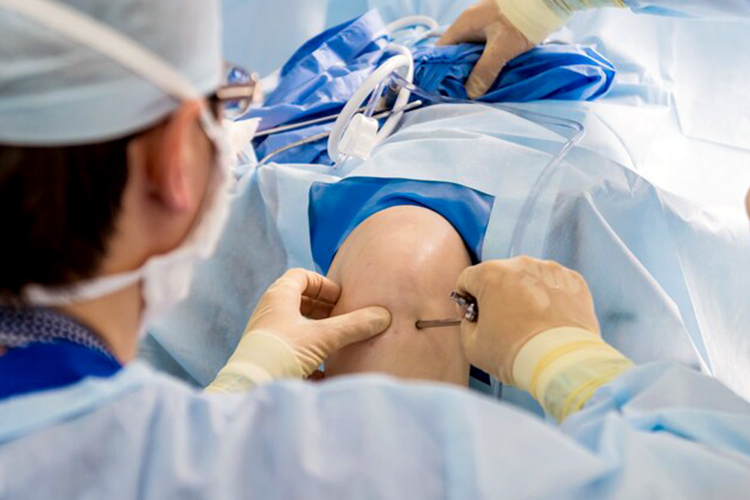Orthopedic Surgery

What Is Orthopaedic Surgery?
Orthopaedic surgery is a surgical specialty that focuses on the diagnosis, treatment, and rehabilitation of disorders and injuries of the musculoskeletal system, which includes bones, joints, ligaments, tendons, muscles, and nerves.
What Are the Types of Orthopaedic Surgery?
Types of Orthopaedic Surgeries:
- Joint replacement surgery: This involves replacing a damaged joint with an artificial joint, which can provide relief from pain and improve mobility.
- Arthroscopy: This is a minimally invasive surgical procedure used to diagnose and treat problems within a joint, such as torn ligaments or cartilage.
- Spine surgery: This includes procedures to treat conditions such as herniated discs, spinal stenosis, and scoliosis.
- Fracture repair: This involves resetting and stabilizing broken bones to promote healing.
- Sports medicine surgery: This includes procedures to treat sports-related injuries, such as ACL tears and rotator cuff tears.
- Hand and wrist surgery: This includes procedures to treat conditions such as carpal tunnel syndrome and trigger finger.
What Are Orthopaedic Surgery Procedures?
Orthopaedic surgery procedures vary depending on the specific condition being treated. Some common procedures include:
- Joint replacement surgeries include hip replacement ones & knee replacement ones.
- Arthroscopic surgeries, wherein a small camera is utilised along with specialized instruments for repairing damaged joints.
- Spinal fusion surgery, which involves joining two or more vertebrae together to provide stability and reduce pain.
- Repair of fractures using surgical screws, pins, or plates to hold the broken bones in place.
- Repair of torn ligaments or tendons using sutures or grafts.
Rehabilitations after Orthopaedic Surgery
Rehabilitation after orthopaedic surgery typically involves physical therapy and exercise to restore strength, flexibility, and range of motion to the affected area. Depending on the type of surgery and the extent of the injury, rehabilitation may last several weeks to several months.
What Are the Risks Associated with Orthopaedic Surgery?
Just as all surgical procedures come with their own set of risks, orthopaedic surgery too has some risks associated with it. Some common risks include infection, bleeding, nerve damage, and blood clots. Other risks may include allergic reactions to anaesthesia, complications from medical conditions such as diabetes, and the potential for the surgery to be unsuccessful.
How to Prepare for Orthopaedic Surgery?
Preparation for any of the orthopaedic surgeries largely involves multiple steps, which include the ones given underneath:
- Meeting with your surgeon to discuss the procedure and any potential risks or complications.
- Completing any preoperative testing, such as blood work or imaging scans.
- Following any preoperative instructions, such as fasting or stopping certain medications.
- Arranging for someone to help you at home after the surgery.
- Making any necessary modifications to your home, such as installing grab bars or a raised toilet seat.
- Planning for your recovery, including arranging for time off work or other activities.
Come to Health Trawell for Orthopaedic Surgery in India
Overall, the success of any orthopaedic surgery depends on a variety of factors, including the type of surgery, the severity of the injury or condition, and the patient’s overall health and ability to participate in rehabilitation. For ensuring the best results with your orthopaedic surgery in India, you can get in touch with the team at Health Trawell; they will guide you all through the process and arrange for your medical travel in India in toto.
Recent Posts
-
The Complete Price Guide To Cancer Radiotherapy In India
-
Cost Of Treatment For Lung Cancer In India: A Comprehensive Guide
-
Cancer Chemotherapy Costs: Comparing Prices Across Major Cities In India
-
How Much Does Biopsy Cost In India? A Detailed Breakdown
-
Prostate Cancer Treatment Costs in India: An In-Depth Analysis
-
Psychological Factors Affecting Male Performance
-
Lung Cancer Treatment Cost In India: What To Expect
-
Understanding Leukemia Treatment Costs in India
-
Erection Problems: Common Causes and Effective Solutions
-
Cost of Breast Cancer Chemotherapy in India: A Detailed Overview
-
Best Hospitals In India For Erectile Dysfunction Treatment
-
Understanding Kidney Stones Surgery Cost: What to Expect
-
Sexual Problems In Men: When To See A Doctor
-
Erectile Meaning in English: Understanding the Science
-
Dysfunction Meaning & Its Impact on Sexual Health
